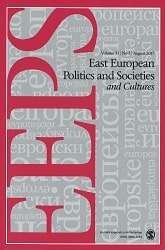Uniting the Enemy: Politics and the Convergence of Nationalisms in Slovakia
Uniting the Enemy: Politics and the Convergence of Nationalisms in Slovakia
Author(s): Kevin Deegan-KrauseSubject(s): Political history, Government/Political systems, Nationalism Studies, Transformation Period (1990 - 2010), Post-Communist Transformation, Ethnic Minorities Studies
Published by: SAGE Publications Ltd
Keywords: nationalisms; ideological coherence; minority groups; political parties; Slovakia;
Summary/Abstract: Although aggregate popular support for particular nationalisms in Slovakia showed little change during the 1990s, relationships between nationalisms changed significantly. This article uses categories of nationalism derived from the relational typologies of Brubaker and Hechter to analyze surveys of postcommunist Slovak public opinion and demonstrate that popular nationalisms against Czechs, Hungarians, the West, and nonnationalist Slovaks bore little relationship to one another at the time of Slovakia’s independence but converged over time. With the encouragement of nationalist political elites, a large share of the Slovak population became convinced that Slovakia faced threats from all sides and that the country’s enemies were actually working together to undermine its sovereignty. The example of Slovakia thus provides an important case study for understanding how the complex and interactions between distinct nationalisms creates opportunities for the influence of political leadership.
Journal: East European Politics and Societies
- Issue Year: 18/2004
- Issue No: 04
- Page Range: 651-696
- Page Count: 46
- Language: English
- Content File-PDF

